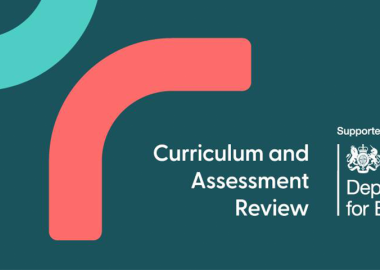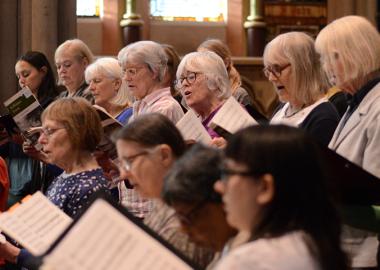Making Music and other music sector organisations are calling for the eligibility criteria for Orchestra Tax Relief to be changed so choirs can also benefit. Making Music members can support this call by approaching MPs to raise this issue.
The organisations and networks supporting this call include: Association of British Orchestras, UK Music, Musicians’ Union, Independent Society of Musicians, PRS for Music, Ivors Academy, Association of British Choral Directors, English Folk Dance and Song Society, Music Mark, Making Music and 30 others.
In September 2024, we submitted this proposal to HM Treasury in advance of the Autumn Budget. It was not adopted then, but we have now submitted the proposal with more evidence and detail to the Spending Review. The outcome will be announced in June, so now is the moment to write to your MPs about this, and there’s guidance on this page on how to do that.
READ THE SUMMARY OF OUR SUBMISSION
What are creative tax reliefs and why are choirs not eligible?
Over the last 20 years governments have introduced various creative tax reliefs to enable organisations to claim back some of their production costs. Two of these tax reliefs – Orchestra Tax Relief (OTR) and Theatre Tax Relief (TTR) – are already being used by Making Music members to claim back an average 26% of their concert and event costs, amounting to £620k in 2024 alone. The new UK government recognised the importance of these tax reliefs and their impact by committing in the Autumn 2024 budget to maintain the permanent higher rate of 45% previously announced by the Conservative government.
These tax reliefs have made a significant contribution to groups’ budgets (average increase of 50% in concert budgets between first and most recent claims by Making Music instrumental groups) and facilitated growth and activity. Music groups produce more and larger work and events, engage more professionals (average 55% more spend on professional musicians) and programme and commission more new work (some increasing their music budget by a factor of four or even six) , enabling more participants and audiences to experience the joy of live music performance.
To be eligible for OTR, a performance must include 12 or more instruments that are not directly amplified. That means all kinds of instrumental groups can claim, not just orchestras: brass and concert bands, string players, handbell ringers, jazz bands, flute choirs...
But 'voice' is not an eligible instrument, so concerts that are organised by choirs or where the performance is mostly vocal do not qualify.
What are the benefits for choirs, their audiences and all of us?
As a review of OTR in preparation for the 2024 budget, the Association of British Orchestras and others submitted case studies and data to HMRC and the Treasury. This proved that OTR support translates into more ambitious and larger scale programming, more professionals engaged and commissioned, increased venue hires and growth in night-time economy. There is no doubt that this effect would be extended if choirs were included.
All this facilitates the sustainability of the music sector and a greater reach of audiences and new participants, with all the ensuing secondary benefits to individual wellbeing, educational attainment, pride of place, community cohesion, regeneration, and social inclusion.
The professional and non-professional choir sector in this country is considerable. We estimate the number of professional choirs (i.e. where all singers are professional) in the UK to be around 100 (estimated as there is no network organisation representing them). There is a larger number of choirs made up of non-professional singers, as the UK has a strong tradition of choral singing. Data suggests there are at least 9,000 across the UK.
Currently a lack of inward investment is holding back the economic growth of the choir sector and the significant contribution choirs make to professionals’ portfolio careers; they engage around 30,000 choir leaders, composers and singers every year.
But is it complicated to make a claim?
Claiming tax relief does involve a bit of work and a group is likely to need to make some changes to how it operates. But Making Music has developed a service to process creative tax relief claims for members and has extensive experience in submitting compliant claims to HMRC. Currently, 85 members are registered with us to make claims through this service.
How should I approach my MP?
We’re suggesting you approach your MPs, introducing your group, explaining how extending OTR to choirs would impact your choir, your community, their constituency, and asking them to write to the Chancellor to support this proposal. Contact your MP through this website
We don’t provide template letters as we know that MPs take more notice of constituents who present their own views, and how the issue directly affects them and their community. When writing or emailing we suggest you include the following:
- A brief description of your group, including where you rehearse and perform within that constituency. Include data like numbers of members, concerts, and audiences.
- Outline the issue and the proposal - you can use some of the data and arguments from our submission.
- Explain what the additional income from this tax relief could enable you to do. Focus on development – what new or more activity could you do? This is a stronger argument than saying your group will fail without this income.
- Explain the benefits to the wider community this would have; as well as access to music, these could be economic, educational, health and well-being, place-making.
- Call to action – this is a decision that would be made by the Treasury, so ask your MPs to let the Treasury know they support this proposal.
- Keep up the connection. If you have a concert coming up, include an invitation to this. Keep your MP on your invite or mailing list permanently, to nurture this relationship.
Read more about our Orchestra Tax Relief service.










